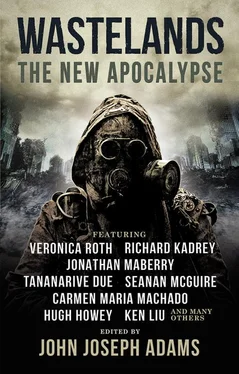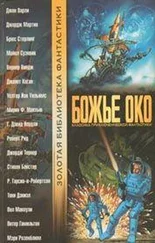Welcome to the end of the world, it said.
Not with a bang, but a whimper.
* * *
The snow kept coming, gusts of it, obscuring everything a dozen feet beyond the windows, then unveiling it in quick flashes: the blurred limb of a naked tree, the shadow of the Yukon at the curb. Kerans stood at the window as night fell, wondering what he’d expected to find. A hospital? A doctor? The hospitals must have been overwhelmed from the start, the doctors first to go.
The streetlights snapped alight—solar-charged batteries, the death throes of the world he’d grown up in. They illuminated clouds of billowing white that in other circumstances Kerans would have found beautiful. Cold groped at the window. He turned away.
Lanyan and Natalie had scrounged a handful of tealight candles. By their flickering luminescence, the great room took on a cathedral air. Darkness encroached from the corners and gathered in shrouds at the ceiling. They ate pork and beans warmed over the camp stove, spread their sleeping bags on the carpet, and talked. The same goddamn conversation they’d had for days now: surely we’re not the only ones and how many? and where? and what if?
“We’re probably already dying,” Natalie said, turning a baleful eye on Kerans. “Well, we’re down here now,” she said. “What’s your plan, Einstein?”
“I don’t have a plan. I didn’t figure on the snow.”
“You didn’t figure on a lot of things.”
“Cut it out,” Lanyan said.
“We didn’t have to do this, Cliff,” Natalie said.
“What did you expect me to do? I’ve known Felicia for years. I’ve known Dave longer. It’s not like we had access to weather reports.”
No, Kerans thought, that was another thing gone with the old world. Just like that. Everything evaporated.
By then the cold had become black, physical.
Kerans got to his feet. He tucked Felicia’s sleeping bag into the crevices of the sofa. She moaned. Her eyes fluttered. She reached for his hand.
Kerans shook two oxycodone out of the bottle.
“These’ll help you sleep.”
“Will you stay with me, Dave?”
All the way to the end, he thought, and he knew then that at some level, if only half-consciously, he had accepted what he had known in his heart back at the cabin. She was gone. She’d been gone the moment she’d slipped on that bed of scree. And he’d laughed, he remembered that, too. Whoops , he’d said, and she’d said, I’m hurt, Dave , her voice plaintive, frightened, tight with agony. He’d never heard her use that voice in seventeen years of marriage, and he knew then that she was beyond help. There was no help to be had. What had Natalie said? The rules have changed. We have to watch out for ourselves now . Yet Lanyan had surrendered the Yukon, and they had knocked on the door before barging into this house, just as they had knocked on the door of the summer cabin in the mountains before that. How long, he wondered, before they reverted to savagery?
“Will you stay with me, Dave?” she said.
“Of course.”
He slid into his sleeping bag. They held hands by candlelight until the oxycodone hit her and her fingers went limp. He tucked her arm under her sleeping bag—he could smell the wound, already suppurating with infection—and lay back.
The last of the tealights burned out.
Kerans glanced at the luminescent dial of his watch. Nine-thirty.
The streetlights’ spectral blue glow suffused the air.
He closed his eyes, but sleep eluded him. An endless loop unspooled against the dark screens of his eyelids: Felicia’s expression as the earth slipped out from under her feet. His helpless whoop of laughter. I’m hurt, Dave .
He opened his eyes.
“You awake, Cliff?” he said.
“Yeah.”
“You think Natalie’s right? We’re all going to wind up coughing up blood in twenty-four hours or so?”
“I don’t know.”
“Maybe the snow,” Kerans said. “Maybe the cold has killed the virus.”
“Maybe.”
They were silent.
“One way or the other, we’ll find out, I guess,” Lanyan said.
Snow ticked at the windows like fingernails. Let me in. Let me in.
“About the Yukon—” Kerans said.
“It doesn’t matter, Dave. You’d have done the same for me.”
Would he? Kerans wondered. He liked to think so.
“I’m sorry I was an asshole,” Lanyan said.
“It doesn’t matter.”
“Felicia’s going to be okay.”
“Sure she is. I know.”
Kerans gazed across the room at the shadowy mound of the other man in his sleeping bag.
“What do you figure happened?”
“Hell, I don’t know. You heard the radio as well as I did. Something got loose from a military lab. Terrorists. Maybe just a mutation. Ebola, something like that.”
Another conversation they’d had a dozen times. It was like picking a scab.
A long time passed. Kerans didn’t know how long it was.
“It doesn’t matter, I guess,” he said, adrift between sleep and waking.
“Not anymore,” Lanyan said, and the words chased Kerans down a dark hole into sleep.
* * *
Lanyan woke him into that same unearthly blue light, and for a moment Kerans didn’t know where he was. Only that strange undersea radiance, his sense of time and place out of joint, a chill undertow of anxiety. Then it all came flooding back, the plague, Felicia’s fall, the blizzard.
Lanyan’s expression echoed his unease.
“Get up,” he said.
“What’s going on?”
“Just get up.”
Kerans followed him to the window. Natalie crouched there, gazing out into the sheets of blowing snow. She held the pistol in one hand.
“What is it?” he whispered.
“There’s something in the snow,” she said.
“What?”
“I heard it. It woke me up.”
“You hear anything, Cliff?”
Lanyan shrugged.
Wind tore at the house, rattling gutters. Kerans peered into the snow, but if there was anything out there, he couldn’t see it. He couldn’t see anything but a world gone white. The streetlamp loomed above them, a bulb of fuzzy blue light untethered from the earth.
“Heard what?” he asked.
“I don’t know. It woke me. Something in the snow.”
“The wind,” Kerans said.
“It sounded like it was alive.”
“Listen to it blow out there. You could hear anything in that. The brain, it”—he hesitated—
“What?” Natalie said.
“All I’m saying is, it’s easy enough to imagine something like that. Voices in the wind. Shapes in the snow.”
Natalie’s breath fogged the window. “I didn’t imagine anything.”
“Look,” he said. “It’s late. We’re all tired. You could have imagined something, that’s all I’m saying.”
“I said I didn’t imagine it.”
And then, as though the very words had summoned it into being, a thin shriek carved the wind—alien, predatory, unearthly as the cry of a hunting raptor. The snow muffled it, made it hard to track how far away it was, but it was closer than Kerans wanted it to be. It held for a moment, wavering, and dropped away. A heartbeat passed, then two, and then came an answering cry, farther away. Kerans swallowed hard, put his back to the wall, and slid to the floor. He pulled his knees up, dropped his head between them. He could feel the cold radiating from the window, shivering erect the tiny hairs on his neck. He looked up. His breath unfurled in the gloom. They were both watching him, Lanyan and Natalie.
“It’s the wind,” he said. Hating himself as he said it, hating this new weakness he’d discovered in himself, this inability to face what in his heart he knew to be true.
Читать дальше


![Nick Cracknell - The Quiet Apocalypse [= Island Zero]](/books/28041/nick-cracknell-the-quiet-apocalypse-island-zero-thumb.webp)









